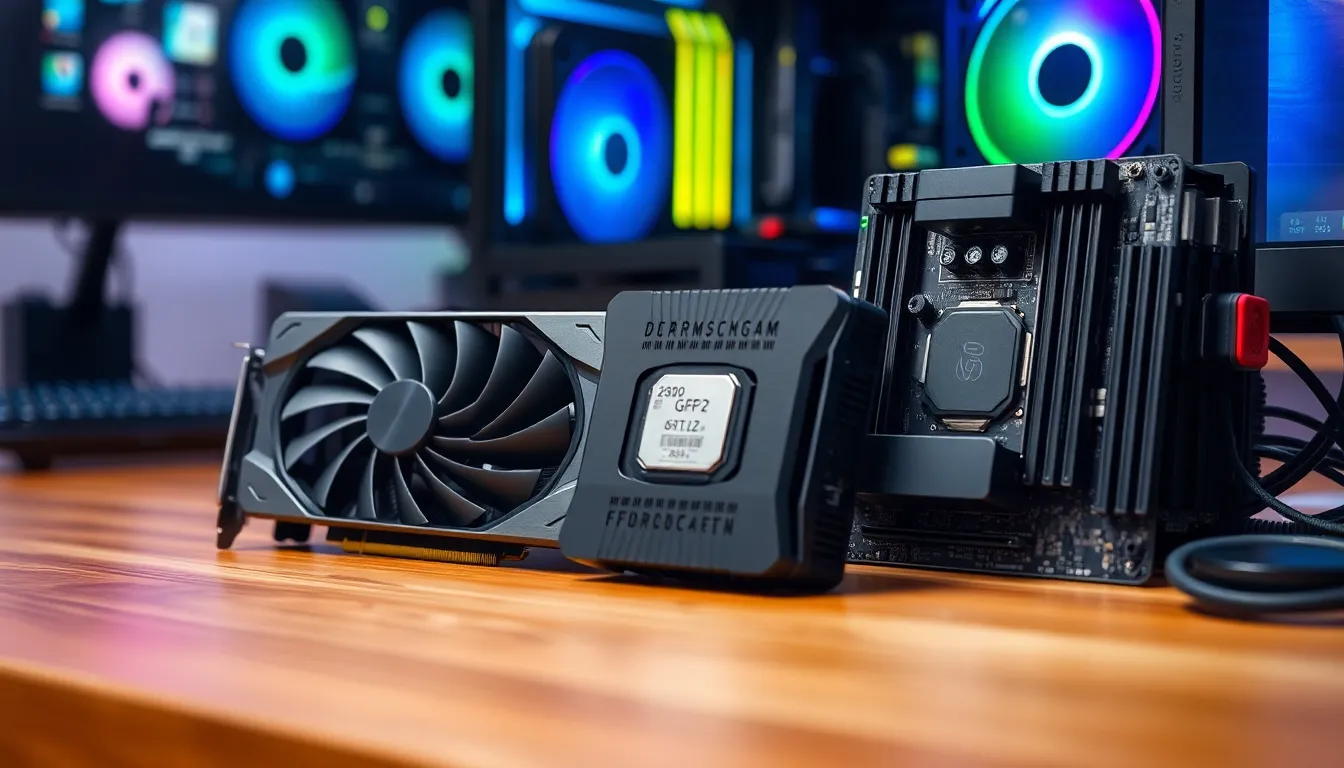Table of Contents
ToggleIn the fast-paced world of technology, choosing the right PC hardware can feel overwhelming. With countless options available, how does one navigate the sea of components? That’s where insightful reviews come into play, guiding users through the intricate details of performance, compatibility, and value.
PC hardware reviews not only break down specifications but also highlight real-world performance, helping enthusiasts and casual users alike make informed decisions. Whether it’s a powerful graphics card or a reliable motherboard, understanding the nuances of each component can elevate a gaming rig or enhance productivity. By diving into the latest reviews, readers can discover the best hardware tailored to their needs, ensuring they get the most out of their investment.
Overview of PC Hardware Reviews
PC hardware reviews play a crucial role in navigating the complex technology market. These reviews assess critical features, such as specifications, performance metrics, and compatibility of components. Detailed assessments enable users to make informed choices when selecting items like CPUs, GPUs, and motherboards.
High-quality reviews often analyze performance benchmarks, allowing users to compare hardware in real-world scenarios. Reviewers typically run standardized tests to measure how components perform under various conditions, providing insights into potential bottlenecks or advantages.
Furthermore, reviews highlight value for money, which is essential for users with different budget ranges. By addressing aspects like pricing, warranty, and longevity, reviews guide users in maximizing their investment. They also take into account user experiences to offer a holistic view of each product.
Readers benefit from comprehensive analysis found in reviews, as they delve into features, overclocking potential, and thermal performance. This level of detail ensures that both enthusiasts and casual users find hardware suited to their specific requirements, aiding decision-making and enhancing overall satisfaction with technology purchases.
Types of PC Hardware


Understanding the types of PC hardware is essential for informed decision-making. Each component plays a vital role in overall system performance and user experience.
Processors
Processors, or CPUs, serve as the brain of the computer. They execute instructions from software applications and manage data processing. Current models, like the Intel Core i7 and AMD Ryzen 7, offer multiple cores and threads for efficient multitasking. Processors with higher clock speeds improve performance in demanding tasks, such as gaming and content creation. Thermal management and compatibility with motherboards also factor into selection.
Graphics Cards
Graphics cards, or GPUs, handle rendering images, animations, and video. They enhance visual experiences in gaming and professional graphics work. Current offerings, like NVIDIA GeForce RTX 3080 and AMD Radeon RX 6800 XT, support ray tracing and machine learning features. Memory size, bus width, and architecture contribute to performance. Users need to consider their specific graphics requirements in gaming or design to choose suitable options.
Motherboards
Motherboards connect all hardware components, allowing communication between the CPU, RAM, and other parts. They come with various form factors, such as ATX and microATX, which affects system size and expansion. Features like PCIe slots, USB ports, and support for SATA drives vary across models. Compatibility with specific CPUs and RAM types is crucial for seamless functioning. The choice of motherboard impacts upgrade paths and overall system architecture.
RAM
RAM provides temporary storage for data currently in use, influencing system responsiveness and multitasking capabilities. It’s available in various capacities and speeds, with 16GB being a common choice for gaming and productivity tasks. DDR4 and DDR5 are the most prevalent types, with DDR5 offering improved performance in specific applications. Users should assess their workloads and future upgrade plans to select the appropriate RAM.
How to Choose the Right Hardware
Selecting the right PC hardware involves understanding key performance metrics and ensuring compatibility across components. This process enables users to create efficient systems tailored to their specific needs.
Performance Considerations
Performance directly affects the user experience. Prioritize benchmarks that reflect real-world usage. Look for metrics like frame rates in gaming, rendering times in editing software, and overall system responsiveness. Analyzing reviews helps identify CPUs, GPUs, and RAM that provide the desired performance without overspending. For instance, CPUs such as the Intel Core i5-12600K offer excellent performance for gaming and productivity, while GPUs like the NVIDIA GeForce RTX 3070 deliver high frame rates at 1440p resolutions. Consider the intended purpose of the PC, whether it’s for gaming, content creation, or general use, to ensure the hardware aligns with those needs.
Compatibility Issues
Compatibility ensures smooth operation within the PC system. Verify that all selected components work together seamlessly. Check the motherboard’s specifications to ensure it supports the chosen CPU, GPU, and RAM. For example, a motherboard that supports DDR4 RAM may not work with DDR5 RAM. Also, power supply units (PSUs) must provide adequate wattage for all components, preventing system instability. Additionally, review case dimensions to ensure that all hardware fits without obstruction. Compatibility assessments prevent costly returns and replacements, leading to a more satisfying build experience.
The Best PC Hardware of 2023
The landscape of PC hardware in 2023 features outstanding components that balance performance and value. Below is a meticulous review of some of the top choices for processors, graphics cards, and motherboards.
Top Processors Reviewed
Processors (CPUs) of 2023 showcase impressive advancements in performance and efficiency. Popular selections include:
- Intel Core i9-13900K: Delivers exceptional multitasking and gaming performance, boasting up to 24 cores and 32 threads. The high base and boost clock speeds enhance responsiveness in demanding applications.
- AMD Ryzen 9 7950X: Offers a competitive alternative with 16 cores and support for simultaneous multithreading. It excels in content creation and gaming, delivering strong single-threaded and multi-threaded performance.
- Intel Core i7-13700K: Balances price and power, featuring 16 cores with solid performance across productivity and gaming tasks, making it an excellent mid-range choice.
Best Graphics Cards for Gaming
Graphics cards (GPUs) in 2023 significantly elevate gaming experiences. Leading options include:
- NVIDIA GeForce RTX 4080: Provides exceptional ray tracing capabilities and AI-driven features, catering to high-resolution gaming with impressive frame rates and visual fidelity.
- AMD Radeon RX 7900 XT: Competes well with a solid performance in 1440p and 4K gaming while delivering strong power efficiency, making it a great value choice.
- NVIDIA GeForce RTX 4070 Ti: Strikes a balance between performance and cost, featuring excellent ray tracing and DLSS 3 capabilities for enhanced gaming experiences without breaking the bank.
Recommended Motherboards
Motherboards act as the foundation for system stability and upgrade potential. Key recommendations include:
- ASUS ROG Strix Z790-E Gaming WiFi: Offers excellent build quality with robust power delivery, abundant connectivity options, and advanced cooling solutions, ideal for gamers and enthusiasts.
- MSI MAG B650 Tomahawk WiFi: Provides solid performance for AMD builds with ample features, including support for next-gen connectivity and PCIe 5.0.
- Gigabyte X670E AORUS Master: Equipped with premium features, it supports high-performance CPUs and GPUs, ensuring future-proofing for demanding setups.
These selections of processors, graphics cards, and motherboards in 2023 cater to various performance needs, making it easier for users to build tailored systems.
Navigating the world of PC hardware can be daunting but informed reviews make the journey easier. They provide essential insights into performance and compatibility that empower users to make confident choices. By understanding the significance of each component and how they interact, individuals can build systems that meet their unique requirements.
As technology continues to evolve, staying updated on the latest hardware trends is crucial. Quality reviews not only highlight top-performing products but also ensure users get the best value for their investment. Ultimately, well-researched decisions lead to enhanced computing experiences and satisfaction, making the effort to read reviews worthwhile.